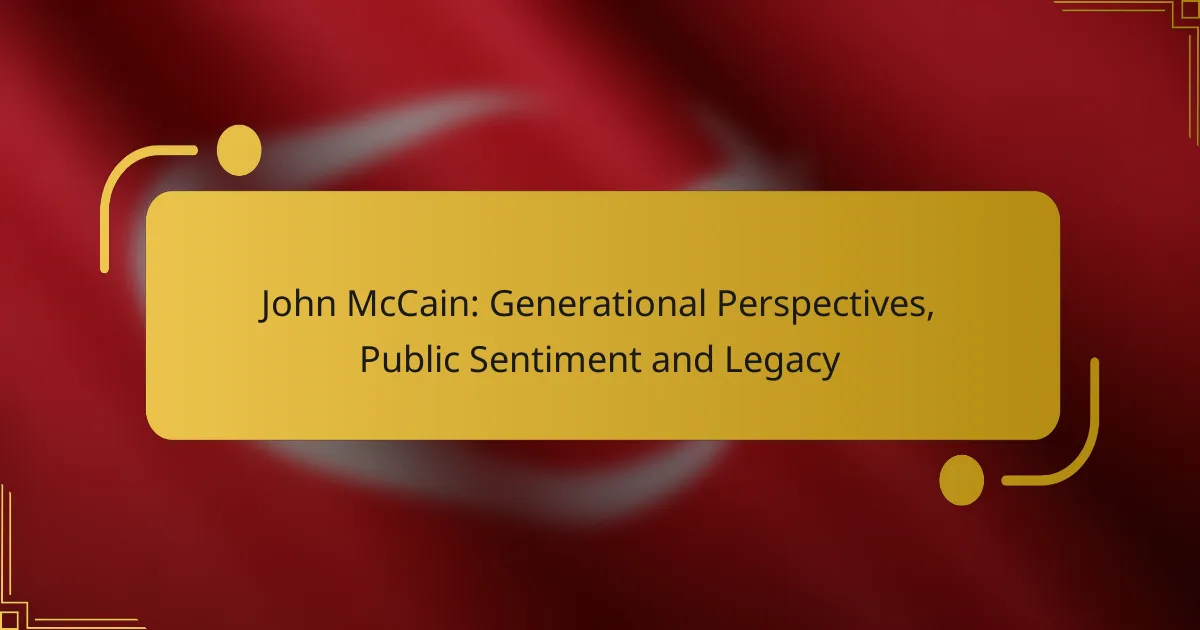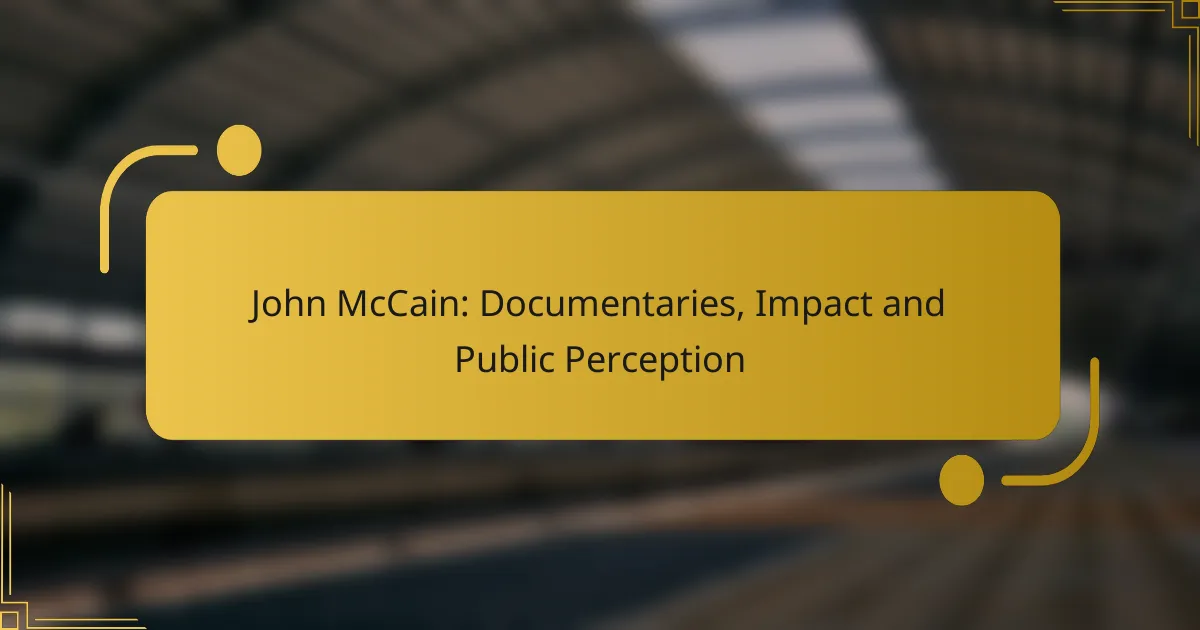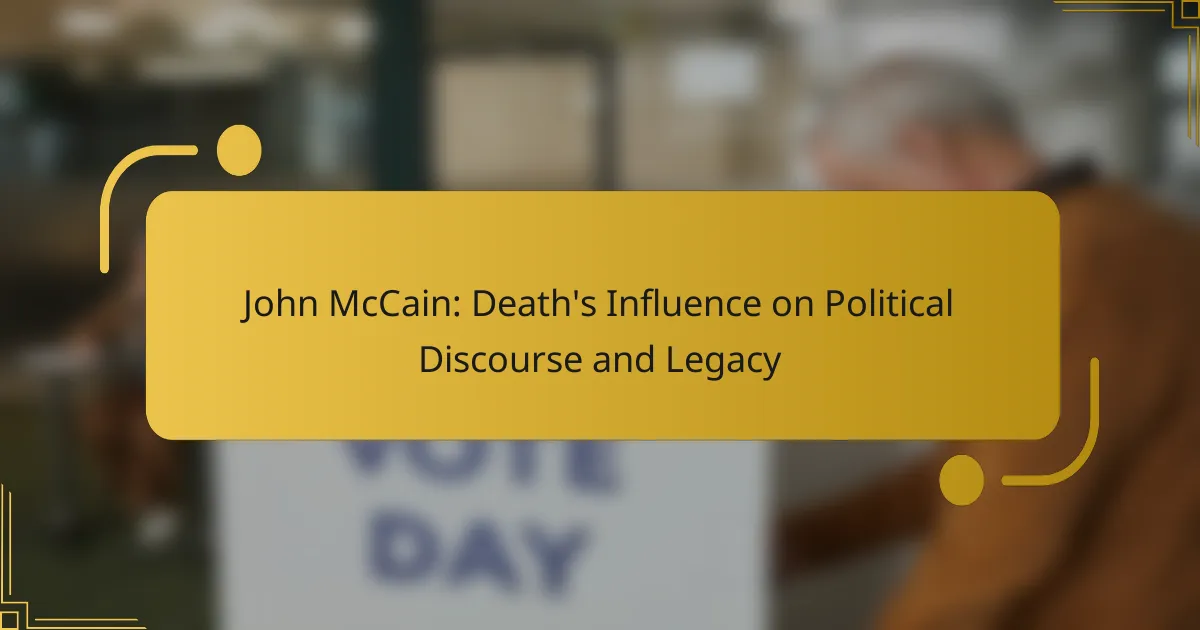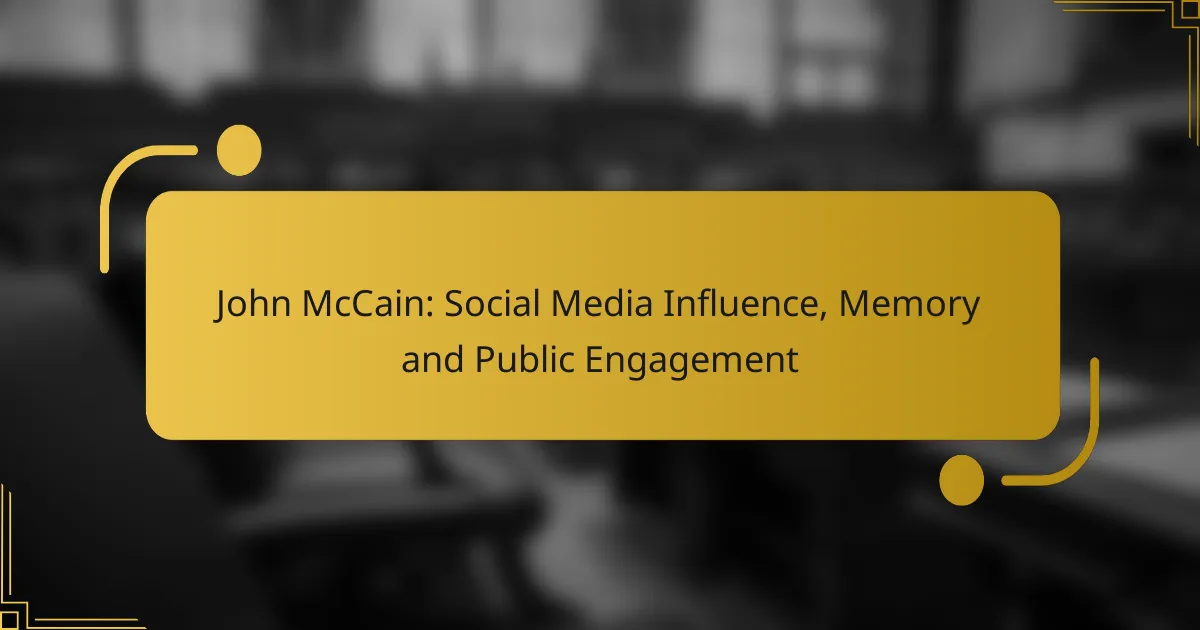John McCain’s legacy in American politics is marked by his dedication to bipartisanship and military service, which garnered respect across the political spectrum. Public sentiment towards him is largely positive, as many recognize his principled leadership and commitment to the nation over party loyalty. However, generational perspectives play a crucial role in shaping how his policies and legacy are viewed, with younger and older individuals often holding differing opinions based on their unique historical contexts.
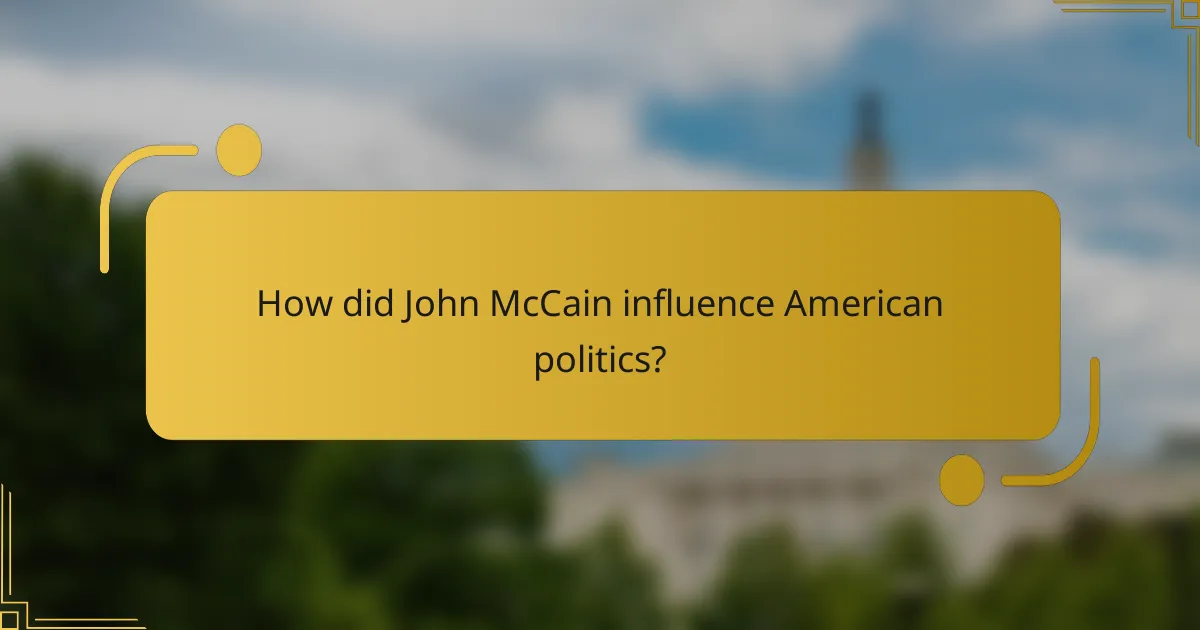
How did John McCain influence American politics?
John McCain significantly influenced American politics through his commitment to bipartisanship, military service, and legislative initiatives. His approach fostered collaboration across party lines and shaped key policies that resonated with a broad spectrum of the electorate.
Key legislative contributions
John McCain’s legislative contributions spanned various critical areas, including healthcare, campaign finance reform, and veterans’ affairs. Notably, he played a pivotal role in the passage of the McCain-Feingold Act, which aimed to regulate campaign financing and reduce the influence of money in politics.
Additionally, McCain was instrumental in advocating for the Veterans Affairs reform, which sought to improve healthcare services for veterans. His efforts led to increased funding and better access to medical care for those who served in the military.
Impact on bipartisan efforts
McCain was renowned for his ability to work across party lines, often collaborating with Democrats on significant legislation. His willingness to compromise was evident in his support for the Affordable Care Act’s repeal efforts, where he ultimately voted against the repeal, emphasizing the need for a more inclusive healthcare approach.
His bipartisan spirit extended to issues like immigration reform, where he co-sponsored comprehensive immigration legislation that aimed to provide a pathway to citizenship for undocumented immigrants. This approach highlighted his belief in finding common ground, even on contentious issues.
Role in military and foreign policy
As a former naval officer and prisoner of war, McCain’s military background profoundly influenced his views on foreign policy. He was a strong advocate for a robust military presence and often emphasized the importance of American leadership on the global stage.
McCain’s stance on foreign policy included support for intervention in conflicts where he believed American values were at stake. He was a vocal critic of isolationism and championed the need for the U.S. to engage with allies and confront adversaries, particularly in the context of the Middle East.
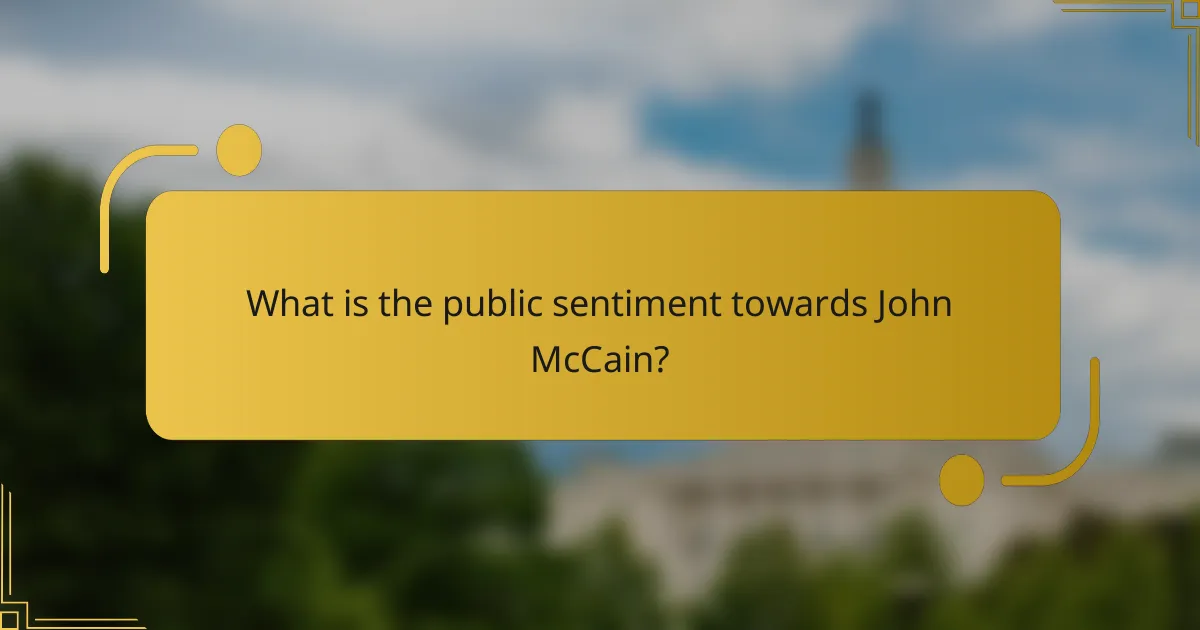
What is the public sentiment towards John McCain?
Public sentiment towards John McCain is generally positive, reflecting respect for his service and bipartisan approach. While opinions vary, many view him as a principled leader who prioritized country over party.
Polls and surveys over the years
Over the years, polls have shown fluctuating support for John McCain, often influenced by current political climates. In the years leading up to his passing, approval ratings among Republicans and independents remained relatively high, often in the range of 60-70 percent. His stance on key issues such as healthcare and immigration garnered both praise and criticism, impacting public perception.
Public perception in Arizona
In Arizona, McCain is viewed as a political icon, with a significant portion of the electorate expressing admiration for his dedication to the state. His long tenure as a senator, spanning over three decades, solidified his status among constituents. Many Arizonans appreciate his efforts in advocating for veterans and immigration reform, although some younger voters may have mixed feelings about his legacy.
Legacy among veterans
Among veterans, John McCain’s legacy is largely revered, particularly due to his own experiences as a POW during the Vietnam War. Many veterans respect his advocacy for military personnel and their families, as well as his commitment to improving veterans’ healthcare. Organizations representing veterans often cite his contributions as pivotal in shaping policies that benefit service members, reinforcing his standing within this community.
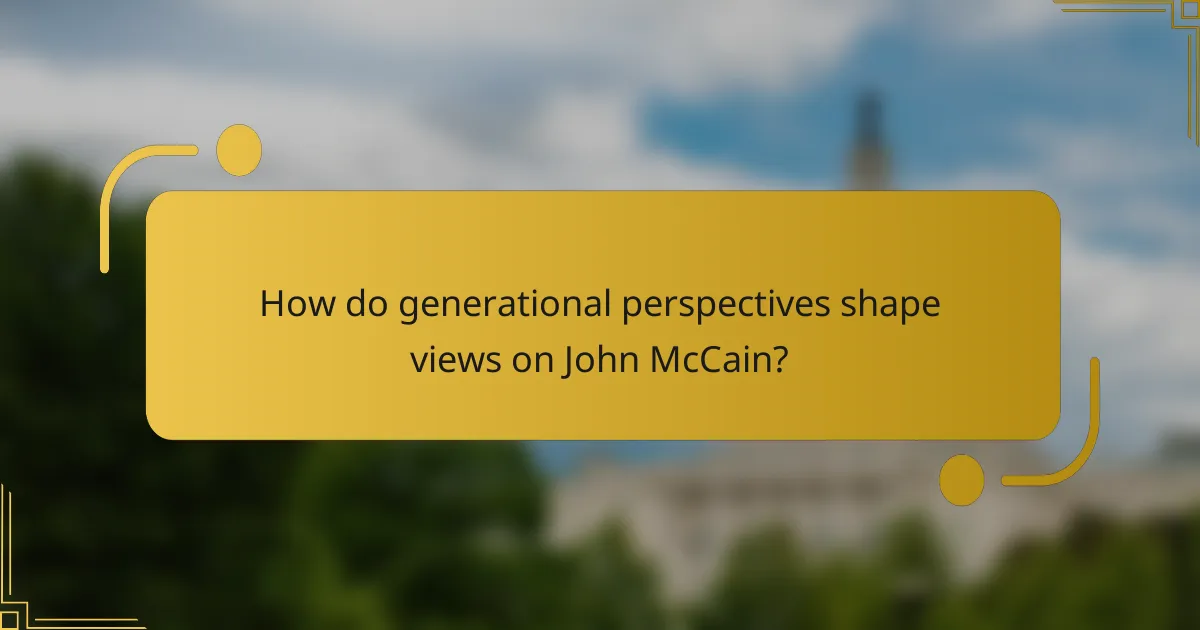
How do generational perspectives shape views on John McCain?
Generational perspectives significantly influence how individuals perceive John McCain’s policies and legacy. Younger and older generations often have contrasting views shaped by their unique historical contexts and political experiences.
Millennial views on McCain’s policies
Millennials tend to view McCain’s policies through a lens of progressive values, often critiquing his stances on issues like immigration and healthcare. Many younger voters appreciate his commitment to bipartisanship but feel that some of his policies do not align with their priorities, such as climate change and social justice.
This generation often values inclusivity and reform, leading them to question McCain’s more traditional Republican positions. As a result, while they respect his service, they may not fully endorse his political legacy.
Baby boomer reflections on his legacy
Baby boomers generally hold a more favorable view of McCain, often admiring his military service and his role as a maverick within the Republican Party. They appreciate his dedication to national security and his willingness to challenge party lines, which resonates with their experiences during pivotal historical moments.
This generation often reflects on McCain’s ability to connect with voters and his emphasis on integrity, viewing him as a principled leader who prioritized country over party. His legacy is often seen as a call for civility in politics, which many boomers believe is increasingly necessary today.
Generational differences in political alignment
Generational differences in political alignment are evident in how various age groups engage with McCain’s legacy. While baby boomers may lean towards traditional conservative values, millennials often gravitate towards progressive ideologies, leading to divergent views on McCain’s impact.
These differences can affect voting behavior, with younger voters more likely to support candidates who align with their progressive views, while older generations may prioritize stability and experience. Understanding these generational divides can provide insight into the evolving political landscape and how McCain’s legacy continues to influence it.
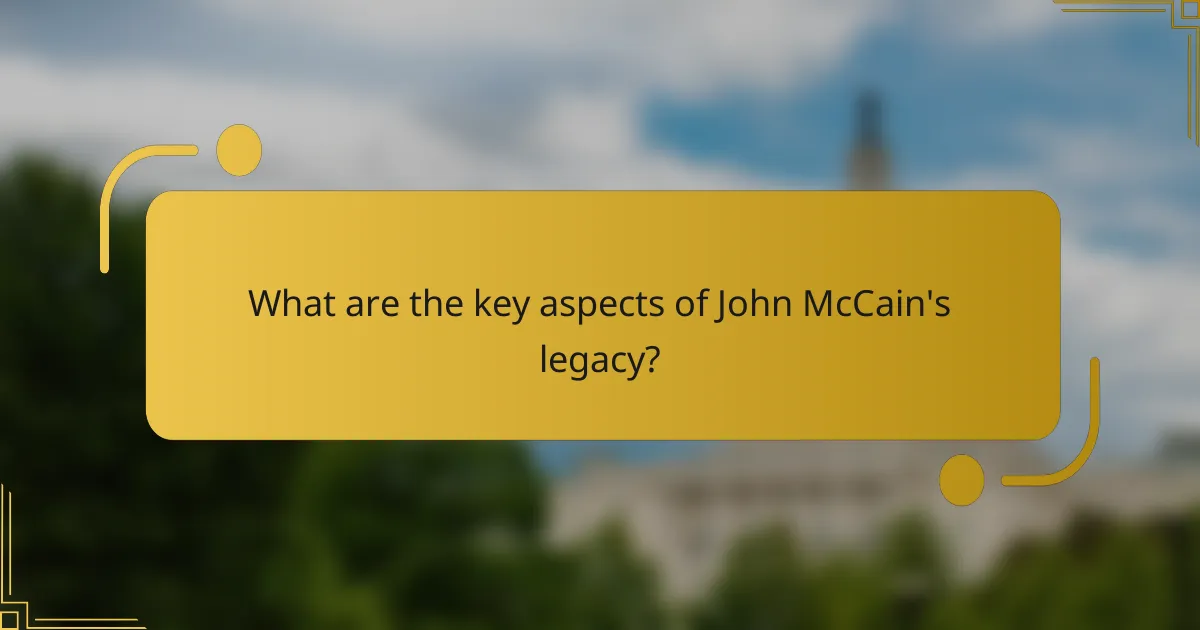
What are the key aspects of John McCain’s legacy?
John McCain’s legacy is defined by his commitment to bipartisanship, his influence on healthcare and national security, and his status as a war hero. His actions and beliefs have left a lasting impact on American politics and public sentiment.
Influence on healthcare reform
John McCain played a significant role in shaping healthcare reform in the United States, particularly through his opposition to the repeal of the Affordable Care Act (ACA). His decisive vote against the repeal highlighted his belief in the importance of accessible healthcare for millions of Americans.
McCain’s stance emphasized the need for bipartisan solutions in healthcare policy. He advocated for reforms that would improve the ACA rather than dismantle it, reflecting his commitment to finding common ground in a polarized political environment.
Contributions to national security
Throughout his career, McCain was a staunch advocate for a strong national defense and a proactive foreign policy. He believed in the importance of military readiness and the need to support allies around the world, particularly in the face of rising global threats.
His contributions to national security included promoting military interventions when necessary and emphasizing the role of diplomacy. McCain’s experience as a naval officer and prisoner of war informed his views on the complexities of war and peace.
Role as a war hero
John McCain’s legacy as a war hero is rooted in his service during the Vietnam War, where he was captured and held as a prisoner for over five years. His resilience and refusal to accept early release showcased his dedication to his country and fellow servicemen.
This experience shaped his character and political career, influencing his views on military service and veterans’ issues. McCain’s story of bravery and sacrifice continues to resonate, inspiring generations to honor and support those who serve in the armed forces.
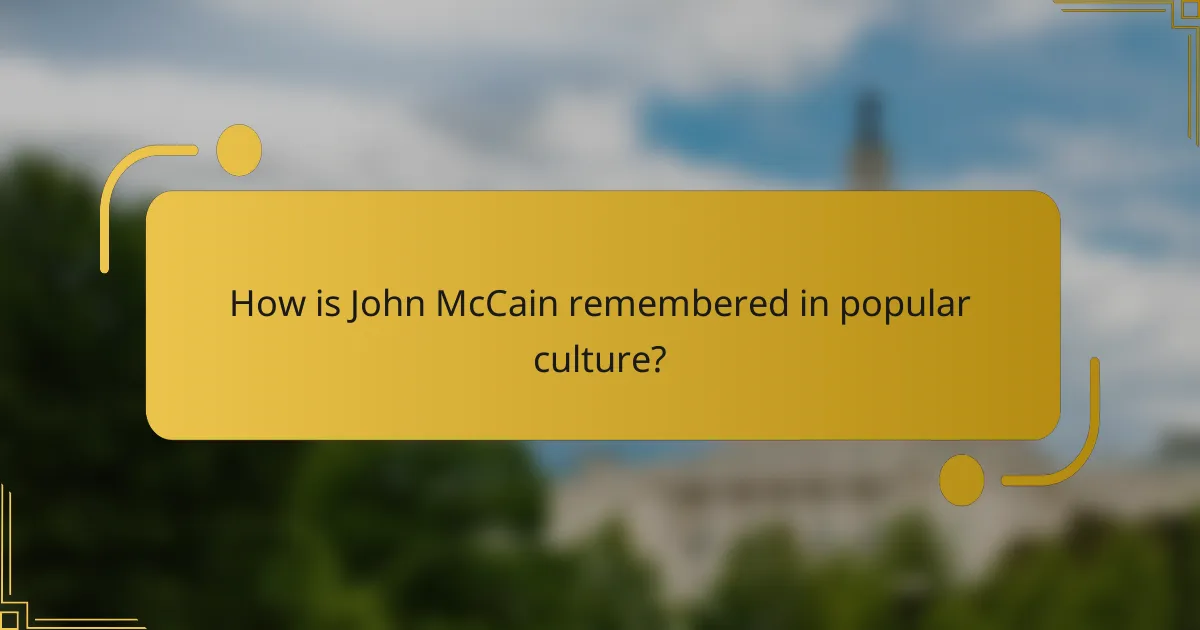
How is John McCain remembered in popular culture?
John McCain is remembered in popular culture as a symbol of bipartisanship, courage, and service to the nation. His legacy is reflected in various media forms that explore his life, values, and political career.
Documentaries and films about McCain
Books authored by and about McCain
References in media and literature

What lessons can be learned from John McCain’s life and career?
John McCain’s life and career offer valuable lessons in resilience, bipartisanship, and the importance of integrity in public service. His ability to navigate personal and political challenges while maintaining a commitment to his principles serves as a model for current and future leaders.
Resilience in Adversity
McCain’s experience as a prisoner of war in Vietnam exemplifies resilience. He endured significant hardships yet emerged with a strong sense of purpose and dedication to his country. This teaches the importance of perseverance in the face of challenges, whether personal or professional.
His ability to overcome adversity can inspire individuals to remain steadfast during difficult times. Embracing challenges as opportunities for growth can lead to greater strength and determination.
Bipartisanship and Collaboration
Throughout his career, McCain championed bipartisanship, believing that collaboration across party lines is essential for effective governance. He often worked with colleagues from opposing parties to achieve common goals, demonstrating that compromise is not a weakness but a strength.
This approach highlights the importance of dialogue and cooperation in politics. By prioritizing shared interests over partisan divides, leaders can foster a more productive political environment.
Integrity and Public Service
McCain’s unwavering commitment to his principles and integrity set a standard for public service. He consistently prioritized the needs of his constituents and the country over personal or political gain, earning respect across the political spectrum.
His legacy serves as a reminder that integrity is crucial in leadership. Upholding ethical standards and being accountable to the public can build trust and inspire future generations of leaders.
